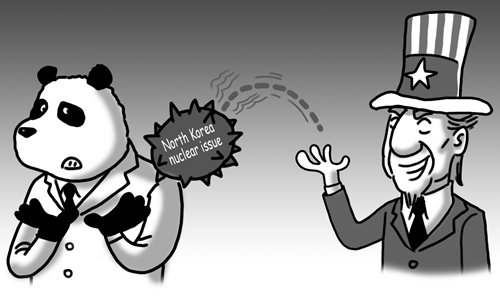US using N.Korea issue to isolate China

Illustration: Liu Rui/GT
North Korea's latest test of an intercontinental ballistic missile last week aggravated tensions on the Korean Peninsula. Using sanctions passed by the UN Security Council, the US has been pressing China's neighboring countries to cut their economic ties with North Korea, stepping up its strategic control of China's neighborhood. China's neighbors like Vietnam, Myanmar, Malaysia and India have long kept economic relations with North Korea in varied scales, which enables Pyongyang to obtain part of its funding for developing military equipment including nuclear weapons.
As the UN augments its sanctions on North Korea, these countries must take into consideration whether their economic ties with Pyongyang will affect their relations with the US. North Korea's nuclear development hence becomes an important issue when the US handles its relations with countries neighboring China.
The US has been playing up the "China responsibility theory" over North Korea in an attempt to divert all the international attention on the peninsula to China. US diplomatic and economic activities surrounding China, based on this intention, are thus an important factor that affects China's relations with its neighbors.
Due to historical reasons, calling for China to take full responsibility for the North Korean nuclear issue has been embraced by some of China's neighboring countries, and they observe the course of China's strategy with neighboring countries through the way China handles Pyongyang's nuclear development.
While the US exerts pressure on China's neighbors by means of UN sanctions on North Korea, it is encouraging these countries to be closer to Washington and meanwhile balancing China's expanding political and economic presence in the surrounding region.
Under US pressure, India banned all trade with North Korea in April, except for food and medicine.
Earlier this month, Joseph Yun, US Special Representative for North Korea Policy, demanded Myanmar completely end its military ties with North Korea during his trip to the Southeast Asian country and considered the break-off a key precondition for the US to fully lift sanctions on Myanmar and normalize bilateral relations. The Myanmese government rejected the US demand and insisted that it has no military engagement with North Korea.
Vietnam, which has maintained close ties with North Korea, also changed its attitude. During the trip of Vietnam's Prime Minister Nguyen Xuan Phuc to the US in May, North Korea and the South China Sea issues, which highly concern the US and Vietnam respectively, were brought up in both his meeting with US President Donald Trump and their joint statement. This means the two sides reached a strategic deal.
The North Korean nuclear issue has become a requirement for China's neighboring countries to take a stand with the US. South Korea and Japan also stepped in and offered some economic benefits for these countries to make up for losses from following US demands.
While cutting its investment in China, South Korea's Kia Motors Corp has turned to invest $1.1 billion on building a manufacturing facility in India in 2019. South Korea's investment in Myanmar has been rising. Daewoo has decided to build a $10 million factory in Yangon to build buses. Last year, South Korea became the biggest investor in Vietnam and their trade volume has seen a quick rise.
Since Trump took office, the US has not formed a complete and explicit framework for its strategy in Asia. But Trump apparently learned from his predecessors to continue making trouble with China in a bid to mobilize countries surrounding China and counter China's rise.
Every time Trump puts all the blame of North Korea's nuclear development on China, he actually eyes China's neighboring countries. After all, isolating North Korea so that no country would maintain any ties with it inflames tensions over the issue, augments US strategic clout in the region and drives a wedge between China and its neighboring countries. We must take this into consideration when analyzing where the North Korean nuclear issue goes.
The author is a senior editor with the People's Daily, and is currently a senior fellow with the Chongyang Institute for Financial Studies at Renmin University of China. dinggang@globaltimes.com.cn. Follow him on Twitter @dinggangchina

